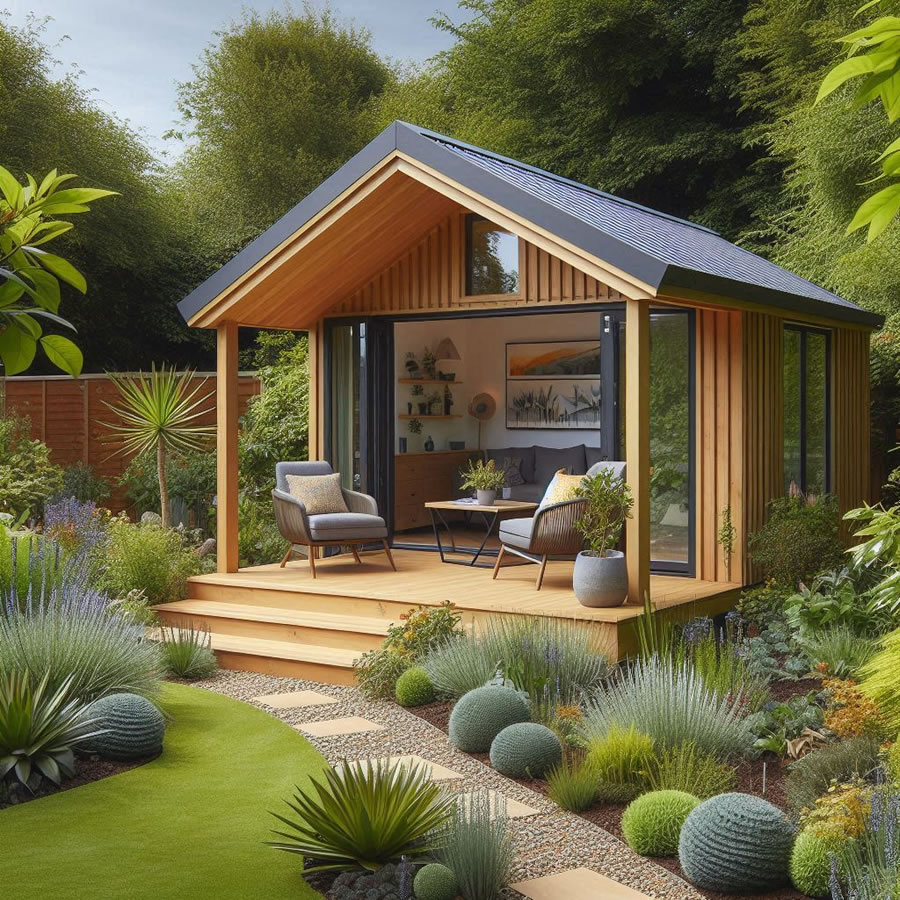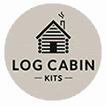Blog
Unlocking Storage Potential: The Benefits of a Garden Cabin
As you look to maximise your outdoor space, you may be wondering how to unlock its full potential. A garden cabin can be the perfect solution, offering a versatile and customisable way to add storage, functionality, and style to your garden. Whether you need a Garden Retreat, Writing Space, Fitness Studio or Summerhouse, a garden cabin can be tailored to meet your unique needs and reflect your personal style. In this guide, we’ll explore the benefits of incorporating a garden cabin into your outdoor space, and how it can transform your garden into a functional and beautiful oasis.
Types of Garden Cabins
Before you start planning your dream garden cabin, it’s crucial to explore the various types available to suit your needs and preferences. You’ll be surprised at the range of options, each with its unique characteristics, benefits, and design elements.

Here are some of the most popular types of garden cabins:
- Traditional Log Cabins
- Contemporary Designs
- Sustainable Options
- Home Offices
- Guest Houses
You’ll be amazed at the diversity of choices available to transform your outdoor space.
| Traditional Log Cabins | Classic, rustic design, often featuring wooden logs and a cozy atmosphere |
| Contemporary Designs | Sleek, modern look, incorporating materials like metal, glass, and recycled materials |
| Sustainable Options | Eco-friendly materials, energy-efficient features, and minimal environmental impact |
| Home Offices | Functional spaces designed for productivity, often featuring desks, shelving, and good lighting |
| Guest Houses | Cosy, self-contained units perfect for accommodating visitors or family members |
Traditional Log Cabins
Alike their ancestors, traditional log cabins evoke a sense of rustic charm and cosiness. These cabins often feature wooden logs, sometimes with a natural finish, and are designed to blend seamlessly into their surroundings.
Contemporary Designs
Comparable to modern architecture, contemporary garden cabins boast sleek lines, minimal ornamentation, and an emphasis on functionality. These structures often incorporate sustainable materials, large windows, and sliding doors to create a seamless transition between indoors and outdoors.
Understanding the nuances of contemporary designs allows you to create a space that not only complements your garden but also reflects your personal style.
Sustainable Options
Some garden cabins prioritise environmental responsibility, using eco-friendly materials, energy-efficient features, and minimizing waste. These sustainable options enable you to reduce your carbon footprint while still enjoying the benefits of a beautiful garden cabin.
Types of sustainable materials used in garden cabins include recycled wood, low-VOC paints, and solar panels, ensuring that your outdoor space is not only beautiful but also environmentally conscious.
Tips for Choosing the Right Garden Cabin
Any homeowner looking to unlock the full potential of their garden with a beautiful cabin must consider several key factors to ensure they find the perfect fit for their needs.
Here are some necessary tips to keep in mind:
- Assess your needs and goals for the cabin
- Set a realistic budget and stick to it
- Select the right materials for your climate and style
- Consider the size and layout of your garden
- Research and choose a reputable supplier or builder
The right garden cabin can transform your outdoor space, but it’s crucial to make an informed decision to ensure you get the most out of your investment.
Assessing Your Needs
Even before you start browsing through designs and materials, take some time to reflect on how you plan to use your garden cabin. Will it be a Garden Retreat, Writing Space, Fitness Studio or Summerhouse ? What features are must-haves, and what can you compromise on?
Considering Your Budget
A necessary aspect of choosing the right garden cabin is setting a realistic budget and sticking to it. Don’t forget to factor in additional costs such as installation, maintenance and any necessary permits.
To avoid overspending, prioritise your needs and allocate your budget accordingly. Be prepared to make some compromises if necessary, but don’t sacrifice quality for the sake of saving a few pounds.
Selecting the Right Materials
Materials matter when it comes to garden cabins. From traditional wood to modern composite materials, each option has its pros and cons.
With sustainability in mind, consider eco-friendly materials that are durable, low-maintenance, and resistant to harsh weather conditions. Research different options and weigh the benefits against your budget and personal preferences.
A Step-by-Step Guide to Building Your Garden Cabin
Once again, building a garden cabin can be a rewarding experience, but it requires careful planning and execution. To help you navigate the process, we’ve broken down the key steps into a comprehensive guide.
| Step | Description |
| 1. Planning and Designing | Determine the purpose, size, and style of your garden cabin |
| 2. Preparing the Site | Clear the land, check for utilities, and level the ground |
| 3. Construction and Installation | Build and assemble the cabin, install doors, windows, and roofing |
Planning and Designing
A necessary first step in building your garden cabin is to define its purpose and functionality. Will it serve as a home office, art studio, or cosy retreat? Consider the size, style, and features that will meet your needs and complement your outdoor space.
Preparing the Site
With a clear plan in hand, it’s time to prepare the site for construction. This involves clearing the land of debris, checking for underground utilities, and leveling the ground to ensure a stable foundation.
For instance, you may need to remove trees, rocks, or other obstacles to create a flat surface. Be sure to mark the boundaries of your cabin’s footprint to guide the construction process.
Construction and Installation
If you’re building a DIY cabin, this step will require careful attention to detail and precision. Follow the manufacturer’s instructions or your custom design plan to assemble the walls, install doors and windows, and add roofing materials.
Preparing the interior space is just as important as the exterior structure. Consider factors like insulation, electrical wiring, and plumbing to ensure a comfortable and functional environment.
Factors to Consider When Customising Your Garden Cabin
After deciding to invest in a garden cabin, you’ll want to consider several factors to ensure it meets your unique needs and complements your outdoor space. Here are some key aspects to think about:
- Size and layout
- Material selection and durability
- Insulation and climate control
- Electrical and plumbing requirements
- Personalisation options and aesthetics
- Integration with existing landscaping
- Sustainability and eco-friendliness
Knowing these factors will help you create a garden cabin that not only meets your functional needs but also enhances the beauty of your outdoor space.
Personalisation Options
Assuming you want your garden cabin to reflect your personal style, you’ll be pleased to know that modern designs offer a wide range of customisation options. From choosing the perfect colour scheme to selecting unique architectural features, you can tailor your cabin to fit your individual taste and preferences.
Integrating with Existing Landscaping
Existing landscaping features, such as trees, slopes, and water elements, should be considered when designing your garden cabin. By incorporating these elements into your design, you can create a seamless transition between your cabin and the surrounding environment.
Integrating your garden cabin with existing landscaping features not only enhances the aesthetic appeal of your outdoor space but also creates a sense of harmony and balance. For example, you could design your cabin to incorporate a natural slope, creating a unique and functional space that blends seamlessly into the surrounding terrain.
Prioritising Sustainability
With increasing concerns about environmental responsibility, prioritising sustainability is crucial when designing your garden cabin. By choosing eco-friendly materials, optimising energy efficiency, and incorporating renewable energy sources, you can create a sustainable space that not only reduces your carbon footprint but also enhances your connection with nature.
Options for sustainable garden cabins include using reclaimed wood, installing solar panels, and incorporating rainwater harvesting systems. By incorporating these eco-friendly features, you can create a garden cabin that not only meets your functional needs but also supports a healthier environment.
Weighing the Pros and Cons of Garden Cabins
Now that you’ve considered the possibilities of having a garden cabin, it’s imperative to weigh the pros and cons of investing in one. To help you make an informed decision, we’ve broken down the advantages and disadvantages into a concise table.
| Pros | Cons |
|---|---|
| Increased storage space | Maintenance requirements |
| Customisable design options | Initial investment cost |
| Multi-functional uses (office, studio, etc.) | Space constraints in smaller gardens |
| Eco-friendly and sustainable options | Potential for pest or weather damage |
| Enhanced aesthetic appeal of the garden | Permitting and regulatory issues |
| Increase in property value | Utility installation costs (electricity, water, etc.) |
| Secluded retreat or guest house option | Limited size and layout options |
| Personalization to reflect individual style | Potential for noise disturbance |
| Year-round usability | Seasonal maintenance and upkeep |
Advantages: Functionality, Aesthetics, and Value
An array of benefits awaits you when you invest in a garden cabin. From increased storage space to customisable design options, these structures offer a range of advantages that can enhance your outdoor living experience. Whether you’re looking to create a multi-functional space or simply add aesthetic appeal to your garden, a garden cabin can provide the perfect solution.
Disadvantages: Maintenance, Cost, and Space Constraints
Maintenance is a crucial aspect to consider when investing in a garden cabin. While the initial investment cost may seem daunting, it’s imperative to factor in ongoing maintenance expenses to ensure your cabin remains in top condition. Additionally, space constraints in smaller gardens and potential utility installation costs can impact your decision.
Pros like increased storage space and multi-functional uses may outweigh the cons for many homeowners. However, it’s vital to carefully weigh these factors to determine whether a garden cabin is the right choice for you and your outdoor space. By understanding the potential drawbacks, you can better prepare yourself for the responsibilities that come with owning a garden cabin.
Summing up
Ultimately, you can unlock the full storage potential of your garden by incorporating a cabin that not only meets your practical needs but also reflects your personal style. With their versatility, customisation options, and eco-friendly designs, garden cabins have become an vital element in modern landscaping. By investing in a garden cabin, you can create a functional and beautiful space that enhances your outdoor environment, providing a tranquil retreat or a bustling hub of activity, depending on your desires.
Disclaimer: This information is subject to change and as such, is provided for informational purposes only and does not constitute professional advice. Readers are encouraged to verify the details independently.
